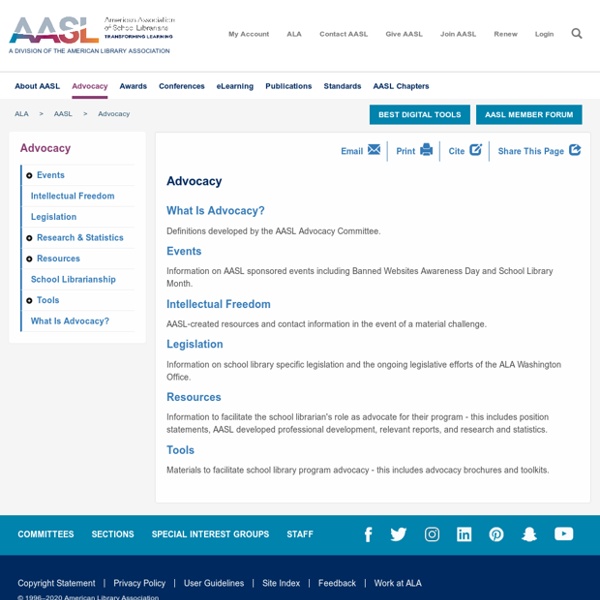School Administrators and the Power of School Librarians
“Life is a series of natural and spontaneous changes. Don’t resist them; that only creates sorrow. Let reality be reality. Let things flow naturally forward in whatever way they like.”― Lao Tzu (n.d.) I love our profession. Look around and listen to other school librarians’ comments about the pandemic in the AASL town halls, on social media, and on the Knowledge Quest website.
Advocacy Library
American Association of School Librarians National School Library Standards AASL’s new integrated standards are designed to empower leaders to transform teaching and learning. The new National School Library Standards for Learners, School Librarians, and School Libraries reflect an evolution of AASL Standards, building on philosophical foundations and familiar elements of previous standards while featuring the new streamlined AASL Standards Integrated Framework for learners, school librarians, and school libraries. Three previously separate publications—AASL Standards for the 21st-Century Learner, Standards in Action, and Empowering Learners—are now framed within a single text, emphasizing the importance of all three standards sets while ensuring that standards-related activities are mutually reinforcing.
A Letter to my Colleagues
As I begin to think about the start of the school year my focus is on how to create positive momentum. I like to make sure that my colleagues view the library the same way I do. A few years back, one of my mentors, Cheri Dobbs (@CheriDobbs) suggested I write a letter to my colleagues to explain my vision for the library.
School Library Advocacy kit
Advocate strong school libraries using the IFLA/UNESCO School Library Manifesto and Guidelines and other resources The IFLA/UNESCO School Library Manifesto defines the mission and goals of the school library or resource center and the profile of its staff. To help schools and school librarians to implement the principles expressed in the manifesto, the IFLA/UNESCO School Library Guidelines were published. The Guidelines help in developing a mission and a policy for the school library.
What 2020 Has Taught Me about Advocacy
2020 has been a roller coaster of emotions for so many of us. It has caused us stress and worry about so many things, from the health and safety of loved ones during the pandemic to the election to the multiple natural disasters. All of these events have us carrying a weight we may not have felt before in our lifetimes. Add to it the additional concerns about how school librarians fit, or don’t fit, into schools’ plans for the future.
* AASL One-Pagers for Stakeholders
One-Pagers for Stakeholders Your School Library in the Learning Community Understanding the National School Library Standards What School Library Standards Mean to Educators
Librarians are not born horn tooters. At least, I'm not. I know that might sound contradictory for someone who a) calls herself "library girl" and b) spends most of her time running around the countryside spreading the gospel of library. But it's true. Tooting my own horn does not come naturally.
Libraries of the Future: Where Trends Are Taking K-12 Public School Libraries
Modern K-12 public libraries will offer intensely engaging learning environments to all students. How they will go about doing this is less certain but the principle trends are readily identified in various research efforts. The goal of this post is not absolutely to regurgitate the details of high-brow research, but rather to summarize the key points, to paint a picture of what the libraries of the future will look like and how they will support students, teachers, administrators, and even parents. The first thing to note is that students are going to have, at their disposal, a greater range of resources than ever before (and that is saying something). A principle goal of school libraries is inevitably to engage students and to provide them with skills necessary to effectively function in academic life.
How to Market For A School Library
Now is the time for librarians to lead, and leadership takes strategy and courage, according to Shannon McClintock Miller, District Teacher Librarian and Innovation Director, Van Meter Community School District in Iowa. In her presentation “Sharing Your Story...Creating A Brand and Advocating For Your Library” during the recent NYC DOE “Beyond Access” virtual forum, Miller shared advocacy and branding ideas and strategies designed to empower librarians and media specialists to share their own library stories, goals, and visions, especially during the challenges of a pandemic. “I feel overwhelmed every day, but I have to step back and think about the things that are most important,” Miller said. “Our kids are in school now, so I think about how I am serving them first. Are the things that I’m creating around our marketing plan helping them, if it’s books, or it’s literacy, or if it’s something else from the library.” Watch the full session:
Celebrating Our Library Culture
Culture is an aged word, but one with staying power. And culture describes just about everything: work, school, family, ethnicity, country, fandom, and on and on. People want to know what defines a culture, how to create and promote it, and how to keep it going.
5 Ways to Advocate without Being in Your Face
Recently, a colleague and friend reminded me that sometimes the louder we get the less people listen. As librarians we know the importance of advocating for our profession. It is our responsibility to share with others what we do to help students and how this looks different from librarians of the past. Since we are often the only person in our building who does our job we have to be careful how loud we get.



